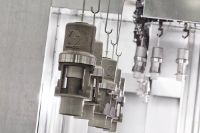5 Reasons to Say 'Yes' to Automated Paint Lines and Robots
Investing in automation and robotic technology is the focus for many industrial factories. Automating your paint line can streamline your operation, improve quality of output and maximize your production.
Why Invest in Robotic Painting?
Though often considered expensive, automation can bring many benefits to your industrial finishing operation that far outweigh the costs.
The five primary reasons that dominate factory automation conversations involve cost, quality, waste, flexibility, and workforce.
5. Reduce Costs
Automation and robotic technology is not as expensive as you think, and is decreasing every year. The initial price might still seem hefty, but automating a manufacturing process will increase output while reducing costs and continue to provide benefits for years to come.
4. Improve Quality
To stay competitive, manufacturers can’t afford to have variation in product quality, especially when it comes to painting. Robots can ensure that the spray gun parameters and spraying motion is exactly the same each time, which increases quality.
Even the most skilled painters can’t ensure that type of consistency and precision for each part. Better consistency means less wasted material (which brings us to the next point).
3. Reduce Waste
Automation can reduce material consumption by up to 30 percent, thanks to the accuracy of robots. Add a plural component proportioner like the ProMix PD, which mixes material close to the gun, and reduce waste even more.
Still not enough? Add electrostatic spray guns to the mix and boost your transfer efficiency (which eliminates even more material waste)!
2. Improve Flexibility
Robots can easily be reprogrammed to do new jobs. Why create a new fixture when a robot can make adjustments on the fly? This flexibility not only saves time during change-overs, it also saves money.
Automation also provides flexibility to change materials and colors more frequently, allowing you to simplify your production planning.
1. Benefit Your Workforce
Robots don’t punch out when the whistle blows and they don’t care if they have to work 24/7. In fact, they can do the work of three employees (3 shifts at 8 hours per day). For this reason, labor and overhead are usually the largest drivers of savings.
Robotic painting benefits the workforce in other ways. When robots do repetitive (not to mention boring) tasks, it reduces on-the-job injuries and job dissatisfaction. Robots can also remove our most valued asset (our people) from dangerous jobs, allowing them to focus on skilled labor jobs that require decision-making and judgment (something robots don’t do as well).
There’s no doubt that automation can save manufacturers money, far exceeding the implementation costs. Companies that don’t think they can afford robotic painting should look again.
Free Webinar
The Quest for Paint Line Automation
This 38-minute webinar equips you with ways make the case for automation and real-life examples of how manufacturers automate some of all of their paint lines.
Related Articles
Automating Your Paint Line: What Parts Should You Consider
These guidelines can help you determine the best parts and processes to automate in your manufacturing painting line.
Automating Your Paint Line: How to Know When You’re Ready
Have you ever wondered if automation might be the right choice for your paint line? Determine if automation is a good fit for your plant.





